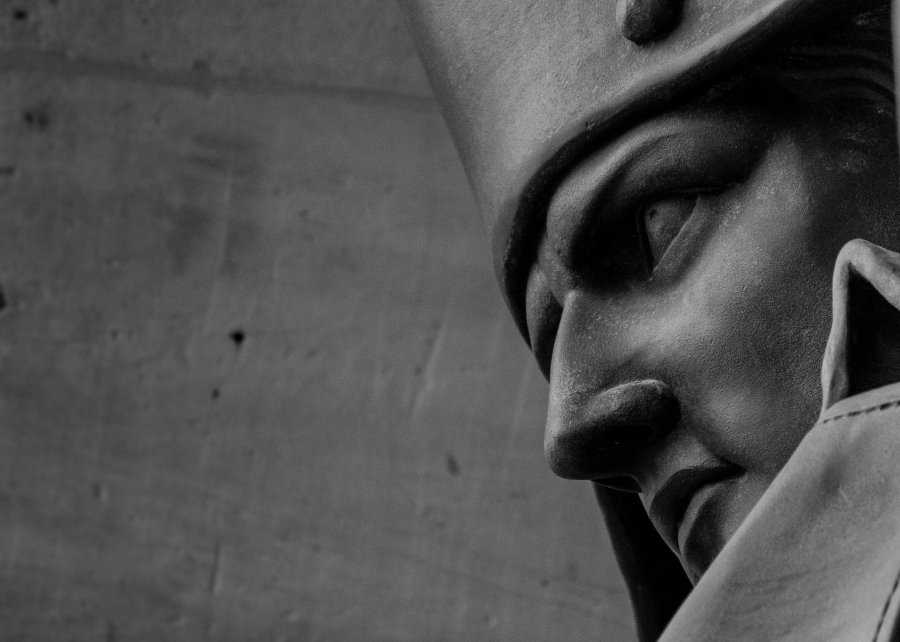Education for Humanity is a Spirit of the Rainbow project, seeking to bring humanity centre stage in our educational process and a more holistic approach to our human story.
At Education for Humanity, we're on a mission to delve deeper into history – not just the highlights but the character traits that shape historical figures. We recognise that these traits can often be contradictory. By examining historical figures through this lens, we can gain a more nuanced and holistic understanding of our human past.
Take Napoleon, for example. Few would deny that he was a brilliant general with an extraordinary memory. As a young officer, he studied Roman law and later astounded jurists by quoting it while working on the Civil Code. His vast knowledge and strategic genius were undoubtedly strengths that propelled him to power.

Detail from bronze statue of Napoleon Bonaparte on Place d'Austerlitz, Corsica
However, with great abilities come great weaknesses. Napoleon's need for control, which served him well in the early stages of his career, became increasingly detrimental as his ambitions grew. When the army was still relatively small, his hands-on approach allowed him to make critical decisions swiftly, contributing to his success. His early victories, such as the Italian campaign of 1796-1797, where he defeated the Austrians against all odds, likely reinforced his belief that he alone knew best.
.png)
Map of Europe, 1812
Yet, as his empire expanded, this desire to control every detail became a liability. The war in Spain (1807-1814) provides a telling example. With operations spread across a theatre over 800 miles wide between Paris and Madrid, Napoleon bombarded his generals and marshals with orders and advice. By the time these messages arrived on horseback, the situation on the ground had often changed, rendering his commands outdated or impossible to execute. Had he granted his marshals more freedom, the military situation in Spain might have improved. Instead, what became known as the "Spanish Ulcer" drained French resources and weakened his grip on power.
At Waterloo in 1815, Napoleon's insistence on total and complete subordination had catastrophic consequences. By that time, Napoleon demanded that his generals follow his orders blindly, and no one dared to question him. He aimed to keep the British and Prussian enemy forces from linking up so he could defeat them separately. He had detached Marshal Grouchy with a sizable force to pursue the Prussians under Blücher, while Napoleon himself would confront the British forces.
.jpg)
Map of the Battle of Waterloo, 18 June 1815
When Grouchy heard the distant cannonade from Waterloo, where Napoleon was fighting the British under Wellington, he insisted on adhering strictly to his orders, refusing to march towards the sound of the guns and join his Emperor. In earlier campaigns, some Marshals, upon hearing the cannonade of a nearby battle, would disregard their orders and reinforce the engaged forces. Grouchy, however, did not. He simply stated, “My duty is to execute the Emperor’s orders.” Even when his second-in-command urged him to detach part of the troops to support Napoleon at Waterloo, he refused.
.jpg)
Portrait of Marquis Emmanuel de Grouchy (1766-1847) by Jean Sebastien Rouillard
As a result, at Waterloo, Napoleon faced defeat, and his army was nearly routed. Grouchy's presence could have mitigated the disastrous outcome.
While Napoleon possessed many admirable qualities, his need for control ultimately undermined him. These examples demonstrate how micromanagement, whether in a military context or within any organisation, can lead to disastrous outcomes. Modern research, such as studies from the Harvard Business Review, supports this – highlighting that micromanagement can lead to decreased productivity and morale.
By Pliny Soocoormanee
Find out more at Education for Humanity
Watch the video Napoleon: Napoleon: New Approaches in our Human Story
Not yet signed up for our newsletter? It only takes a minute, here.
Popular posts
You might also like
Email Newsletter Our latest articles and offers delivered straight to your inbox.
Our latest articles and offers delivered straight to your inbox.